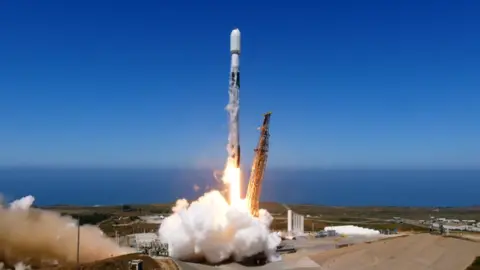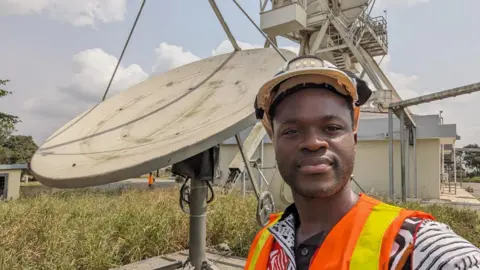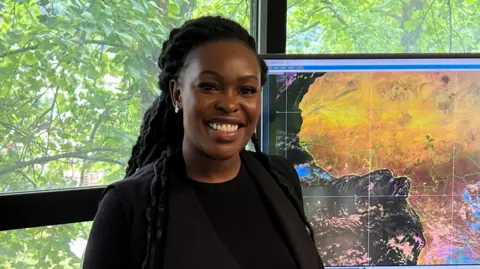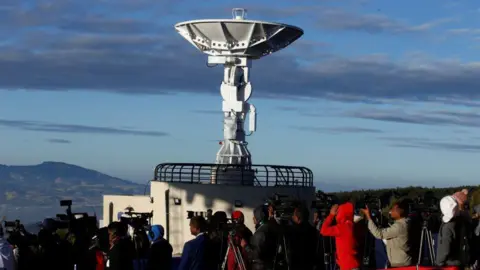Why is there a rush to launch African satellites?
 SpaceX
SpaceXOne by one, the satellites — each covered in a jumble of solar panels and other instruments — separated from their mother ship.
They had lifted off from Earth just an hour earlier, on August 16. The 116 satellites on board the launch vehicle were mostly designed and built by Western countries and companies – but one of them was different.
This was the first spacecraft of its kind developed by the African country of Senegal.
small Cubesat The satellite, named GaindeSAT-1A, will provide Earth observation and communications services. The President of Senegal described it as a big step towards “technological sovereignty.”
Cost of launching a satellite It has decreased significantly in recent yearssays Kwaku Somah, founder and managing director of Spacehubs Africa, a space consultancy.
“This reduction in cost has opened up the market,” he adds. “These small countries… now have the opportunity to participate.”
 Kwaku Somah
Kwaku SomahSo far, 17 African countries have proposed it More than 60 satellites in orbit Along with Senegal, Djibouti and Zimbabwe also saw their first satellites commissioned in the past 12 months. Dozens of other African satellites are expected to enter orbit in the coming years.
However, the continent currently does not have any space launch facilities of its own.
In addition, powerful states elsewhere in the world are arguably using emerging African space programs as a way to build relationships and assert their geopolitical dominance more broadly.
Can more African countries chart their own path into orbit – and beyond?
“It is important for African countries to have their own satellites,” says Mr Somah. This means better control of technology and easier access to satellite data, he says.
He adds that this information could help Africans monitor crops, detect threats posed by extreme weather conditions such as floods, or improve communications in remote areas.
But boldly going into space is still seen as “something for the elite” in Africa, says Jessie Ndaba, co-founder and managing director of Astrovica Technologies, a space technology company in South Africa that specializes in satellite design. She adds that business at her company is still “very slow” in general.
Given the huge The threat facing the continent She suggests that because of climate change, space technology should be used to monitor food and resources. On the other hand, the African space race to reach the Moon or Mars will not be beneficial: “We have to look at the challenges we face in Africa and find ways to solve them.”
For Sarah Kimani, of the Kenya Meteorological Department, satellites have proven invaluable in helping her and her colleagues track dangerous weather conditions. You remember using Earth Observation Data provided by EUMETSATa European space agency, to monitor a large dust storm in March. “We were able to determine the direction of this dust storm,” she says.
Later this year, she and her colleagues will begin receiving data from the latest generation of the EUMETSAT spacecraft, which will provide tools for monitoring wildfires and lightning, among other benefits. “This will help us improve our early warning systems,” Ms. Kimani adds, noting that cooperation with EUMETSAT has been “very effective and effective.”
Climate change brings weather threats that can arise quickly – from major storms to severe droughts. “The severity of these risks…is changing,” says Ms. Kimani, noting that satellite data that can be updated as frequently as every five minutes, or less, would help meteorologists track such phenomena.
It also believes that Kenya – which put the first practical Earth observation satellite into orbit last year – would benefit from having more of its own meteorological spacecraft in the future. As is the case with other African countries in general. “Only Africa understands its own needs,” says Ms. Kimani.
 Sarah Kimani
Sarah KimaniCurrently, many African countries with emerging space programs rely on foreign technology and experts, says Temidayo Onyusun, managing director of Space in Africa, a market research and consulting firm.
Some countries have sent students and engineers abroad to gain knowledge in space technology. “The problem is that when these people come back, there will be no laboratory or facility for them,” Onyewson says.
The new Senegalese satellite was built by Senegalese technicians. Although not wanting to detract from their significant achievement, it is worth noting that the development of the satellite was made possible through a partnership with a French university, and that the spacecraft was launched on a SpaceX Falcon 9 rocket from California.
 Getty Images
Getty ImagesEurope, China and the United States have been involved in several African space programmes. This helped boost African technology in orbit, to be sure, but it served as a “critical diplomatic tool,” Onyewson says. He admits that it makes him “a little anxious.”
Observers have suggested that African space programs are not just about sending African countries into space – they are also, to some extent, arenas where some of the world’s most important space projects are being built. Powerful countries compete with each other.
Mr. Somah is positive about the situation. “We can… play these different forces against each other to get the best deals,” he says.
Officials in both the United States and China have considered the “strategic” implications of involving themselves in African space endeavors, says Julie Klinger, of the University of Delaware.
“This brings with it a growing need to update global treaties and strategies on maintaining a peaceful and controllable space environment,” she adds.
But there are opportunities too. Dr. Klinger points out that space launches from the tropics – Which may not require a lot of fuel – It may mean that African spaceports will have an important role to play in the coming decades.
For example, the Luigi Broglio Space Center, an old spaceport built by Italians that houses an offshore platform off the coast of Kenya, could one day be brought back into service. The last launches there took place in the 1980s.
Eventually, we can expect to see increased activity in space from African countries. “We have approximately 80 satellites currently under development,” Onewson says. “I think the future of the industry is very bright.”

